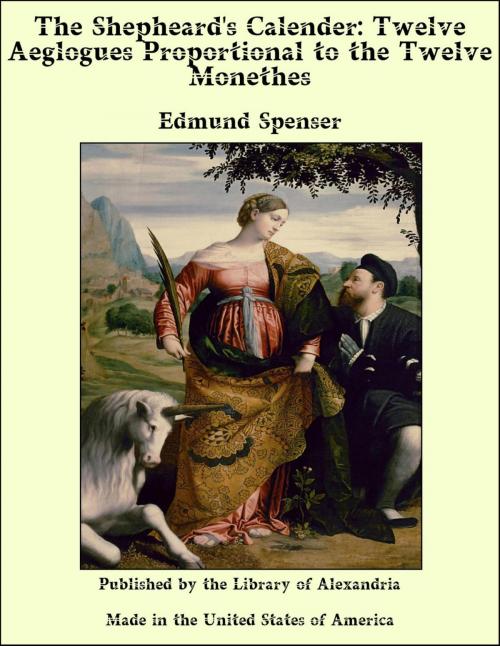The Shepheard's Calender: Twelve Aeglogues Proportional to the Twelve Monethes
Nonfiction, Religion & Spirituality, New Age, History, Fiction & Literature| Author: | Edmund Spenser | ISBN: | 9781465575791 |
| Publisher: | Library of Alexandria | Publication: | March 8, 2015 |
| Imprint: | Language: | English |
| Author: | Edmund Spenser |
| ISBN: | 9781465575791 |
| Publisher: | Library of Alexandria |
| Publication: | March 8, 2015 |
| Imprint: | |
| Language: | English |
Uncouth, unkiss'd, said the old famous poet Chaucer: whom for his excellency and wonderful skill in making, his scholar Lidgate, a worthy scholar of so excellent a maister, calleth the loadstar of our language: and whom our Colin Clout in his Æglogue, calleth Tityrus the god of shepheards, comparing him to the worthiness of the Roman Tityrus, Virgil. Which proverb, mine own good friend M. Harvey, as in that good old poet it served well Pandar's purpose for the bolstering of his bawdy brocage, so very well taketh place in this our new Poet, who for that he is uncouth (as said Chaucer) is unkiss'd, and unknown to most men, is regarded but of a few. But I doubt not, so soon as his name shall come into the knowledge of men, and his worthiness be sounded in the trump of Fame, but that he shall be not only kiss'd, but also beloved of all, embraced of the most, and wonder'd at of the best. No less, I think, deserveth his wittiness in devising, his pithiness in uttering, his complaints of love so lovely, his discourses of pleasure so pleasantly, his pastoral rudeness, his moral wiseness, his due observing of decorum every where, in personages, in seasons, in matter, in speech; and generally, in all seemly simplicity of handling his matters, and framing his words: the which of many things which in him be strange, I know will seem the strangest, and words themselves being so ancient, the knitting of them so short and intricate, and the whole period and compass of speech so delightsome for the roundness, and so grave for the strangeness. And first of the words to speak, I grant they be something hard, and of most men unused, yet both English, and also used of most excellent authors, and most famous poets. In whom, when as this our Poet hath been much travailed and throughly read, how could it be, (as that worthy orator said) but that walking in the sun, although for other cause he walked, yet needs he must be sunburnt; and, having the sound of those ancient poets still ringing in his ears, he must needs, in singing, hit out some of their tunes. But whether he useth them by such casualty and custom, or of set purpose and choice, as thinking them fittest for such rustical rudeness of shepheards, either for that their rough sound would make his rhymes more ragged and rustical; or else because such old and obsolete words are most used of country folk, sure I think, and think I think not amiss, that they bring great grace, and, as one would say, authority to the verse. For albe, amongst many other faults, it specially be objected of Valla against Livy, and of other against Sallust, that with over much study they affect antiquity, as covering thereby credence and honour of elder years; yet I am of opinion, and eke the best learned are of the like, that those ancient solemn words are a great ornament, both in the one, and in the other: the one labouring to set forth in his work an eternal image of antiquity, and the other carefully discoursing matters of gravity and importance. For, if my memory fail not, Tully in that book, wherein he endeavoureth to set forth the pattern of a perfect orator, saith that ofttimes an ancient word maketh the style seem grave, and as it were reverend, no otherwise than we honour and reverence gray hairs for a certain religious regard, which we have of old age.
Uncouth, unkiss'd, said the old famous poet Chaucer: whom for his excellency and wonderful skill in making, his scholar Lidgate, a worthy scholar of so excellent a maister, calleth the loadstar of our language: and whom our Colin Clout in his Æglogue, calleth Tityrus the god of shepheards, comparing him to the worthiness of the Roman Tityrus, Virgil. Which proverb, mine own good friend M. Harvey, as in that good old poet it served well Pandar's purpose for the bolstering of his bawdy brocage, so very well taketh place in this our new Poet, who for that he is uncouth (as said Chaucer) is unkiss'd, and unknown to most men, is regarded but of a few. But I doubt not, so soon as his name shall come into the knowledge of men, and his worthiness be sounded in the trump of Fame, but that he shall be not only kiss'd, but also beloved of all, embraced of the most, and wonder'd at of the best. No less, I think, deserveth his wittiness in devising, his pithiness in uttering, his complaints of love so lovely, his discourses of pleasure so pleasantly, his pastoral rudeness, his moral wiseness, his due observing of decorum every where, in personages, in seasons, in matter, in speech; and generally, in all seemly simplicity of handling his matters, and framing his words: the which of many things which in him be strange, I know will seem the strangest, and words themselves being so ancient, the knitting of them so short and intricate, and the whole period and compass of speech so delightsome for the roundness, and so grave for the strangeness. And first of the words to speak, I grant they be something hard, and of most men unused, yet both English, and also used of most excellent authors, and most famous poets. In whom, when as this our Poet hath been much travailed and throughly read, how could it be, (as that worthy orator said) but that walking in the sun, although for other cause he walked, yet needs he must be sunburnt; and, having the sound of those ancient poets still ringing in his ears, he must needs, in singing, hit out some of their tunes. But whether he useth them by such casualty and custom, or of set purpose and choice, as thinking them fittest for such rustical rudeness of shepheards, either for that their rough sound would make his rhymes more ragged and rustical; or else because such old and obsolete words are most used of country folk, sure I think, and think I think not amiss, that they bring great grace, and, as one would say, authority to the verse. For albe, amongst many other faults, it specially be objected of Valla against Livy, and of other against Sallust, that with over much study they affect antiquity, as covering thereby credence and honour of elder years; yet I am of opinion, and eke the best learned are of the like, that those ancient solemn words are a great ornament, both in the one, and in the other: the one labouring to set forth in his work an eternal image of antiquity, and the other carefully discoursing matters of gravity and importance. For, if my memory fail not, Tully in that book, wherein he endeavoureth to set forth the pattern of a perfect orator, saith that ofttimes an ancient word maketh the style seem grave, and as it were reverend, no otherwise than we honour and reverence gray hairs for a certain religious regard, which we have of old age.















